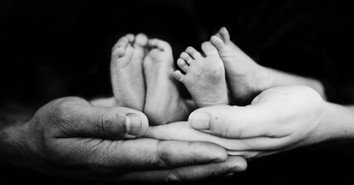The Consequences of Putting 'Our Faith in Money, Jobs, Status, Gadgets, Pleasures, and Thrills'
Former Chinese President Jiang Zemin, the Communist leader who ruled China after the 1989 Tiananmen Square protests and presided over a decade of rapid economic growth, died today at the age of ninety-six. His death and the memorial ceremonies to follow come at a perilous moment in China.
Protesters clashed with riot police last night in the southern Chinese city of Guangzhou, part of a string of demonstrations across the nation against the government’s so-called zero-COVID policy. The restrictions are causing economic hardship and sparking anger over stringent lockdown policies. Protests began last Thursday after a deadly fire at an apartment building in the Xinjiang province. Videos appear to show that lockdown measures delayed firefighters from getting to the victims, at least ten of whom died.
Protests in China are typically directed at local officials. The current demonstrations, however, are aimed at the Chinese Communist Party (CCP) and President Xi Jinping. The Washington Post calls the protests “arguably the most serious and widespread unrest since the 1989 Tiananmen Square pro-democracy demonstrations.” They are being described as the “most severe test” for President Xi since he took power.
CNN has verified twenty-three demonstrations so far across seventeen Chinese cities, including the capital Beijing and the financial center Shanghai. Yesterday, Chinese universities sent students home and police fanned out in Beijing and Shanghai to prevent more protests. Top health officials did acknowledge the impact of their zero-COVID policies and pledged to “reduce inconvenience” to the public by lifting lockdowns “as quickly as possible” following outbreaks. However, this may not be enough to appease the protesters.
The New York Times adds that since China is the world’s largest manufacturing nation, the protests “are injecting a new element of uncertainty and instability into the global economy.” For example, the Dow Jones Industrial Average lost nearly five hundred points on Monday and was essentially flat yesterday. Apple could see a six million unit shortfall in iPhones this year amid manufacturing pressures at a key Chinese plant.
My business ethics experience in Beijing
The unrest in China illustrates the simple but profound fact that ideas change the world. As I have written recently, Xi Jinping’s political system is built on Marxist nationalism that asserts the control of the CCP over every domain of public and private life.
In Marx’s view, the individual is a means to the advancement of society, which in turn (he claimed) will benefit the individual. Thus the state can impose a zero-COVID policy on its citizens, whatever the economic or medical consequences.
As one example, the CCP is insisting on using vaccines developed in China rather than importing Western vaccines that are likely more effective. It would rather impose strict lockdowns than change its approach, despite urging from the World Health Organization to alter its method of dealing with the pandemic.
This atheistic system naively ignores the fact that “all have sinned and fall short of the glory of God” (Romans 3:23). To the contrary, it invests autocratic power in the hands of a single ruler surrounded entirely by loyalists. And it sees people as a means to the end of the state rather than as divinely created bearers of the image of God (Genesis 1:26-27).
I experienced this worldview personally when I visited Beijing some years ago to teach a seminar on business ethics. Those who attended wanted me to address the corruption that is so endemic in their system.
They recognized that bribes, identity theft, and manipulation of market outcomes were poisoning their business environment and undermining their future. But their atheistic culture had no objective ethics to stand upon in countering these practices. And they had no sense of the value of the individual as opposed to the authority of the state.
"He who makes rich is made poor"
My purpose today, however, is less to focus on China’s cultural challenges and more to warn that abandoning the biblical worldview is a threat to America’s future as well.
Billy Graham was right: “Many of us have put our faith in money, jobs, status, gadgets, pleasures, and thrills. Many of us—and society as a whole—have tried to bypass God, and now we are paying the inevitable price. We are in trouble because we have left out God; we have left out the Ten Commandments; we have left out the Sermon on the Mount. Now we as individuals and as a culture are reaping the tragic results.”
The answer to our cultural crisis is found at Christmas. As we have noted this week, the gift of God’s Son demonstrates our Father’s love for each of us. Christ came not because we were worthy of such love but because God is love (1 John 4:8). He made us in his image; when we receive his saving love, he remakes us as his children (John 1:12).
St. Gregory Nazianzen (AD 329–390), the Archbishop of Constantinople, explained the Incarnation this way: “He who makes rich is made poor; he takes on the poverty of my flesh, that I may gain the riches of his divinity. He who is full is made empty; he is emptied for a brief space of his glory, that I may share in his fullness.”
"The New Testament example of the Christian experience"
The question is whether we will make the gift of Christmas an annual holiday or a present-tense reality in our lives.
If we choose the former, we are on the road to abandoning the Judeo-Christian moral foundations upon which our nation was built. What is happening in China can happen anywhere fallen, sinful humans exclude God and his word from their lives and their nation.
If we choose the latter, however, our lives are transformed as the One who was born in Bethlehem’s manger reigns in our hearts and lives. Oswald Chambers noted: “The New Testament example of the Christian experience is that of a personal, passionate devotion to the Person of Jesus Christ.” When I commit myself unconditionally to Christ, “I receive from God the gift of the Holy Spirit, who then begins interpreting to me what Jesus did. The Spirit of God does in me internally all that Jesus Christ did for me externally.”
How “personal” and “passionate” is your “devotion to the Person of Jesus Christ” today?
NOTE: To receive more biblical encouragement throughout your day, follow me on Twitter @JimDenison.
Publication date: November 30, 2022
Photo courtesy: JP Valery/Unsplash
Jim Denison, PhD, is a cultural theologian and the founder and CEO of Denison Ministries. Denison Ministries includes DenisonForum.org, First15.org, ChristianParenting.org, and FoundationsWithJanet.org. Jim speaks biblically into significant cultural issues at Denison Forum. He is the chief author of The Daily Article and has written more than 30 books, including The Coming Tsunami, the Biblical Insight to Tough Questions series, and The Fifth Great Awakening.
The views expressed in this commentary do not necessarily reflect those of CrosswalkHeadlines.
For more from the Denison Forum, please visit www.denisonforum.org.
The Daily Article Podcast is Here!







